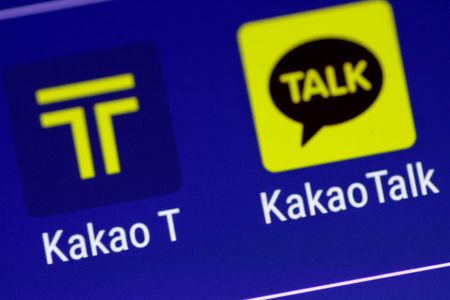 1
1 1
1

By Joyce Lee
SEOUL (Reuters) -Shares of South Korea’s Kakao Corp plunged on Monday after a widespread outage in the country’s largest mobile chat app triggered a sharp political backlash and calls for increased scrutiny on the company’s market dominance.
The outage was caused by a fire at a data centre south of Seoul on the weekend and while systems had mostly been restored by Monday, disruptions to a range of related services from payments to taxis and restaurant bookings have raised questions about public reliance on the app.
President Yoon Suk-yeol said on Monday that Kakao’s services are “like a fundamental national telecommunications network as far as the public is concerned,” and promised follow-up measures over the service outage.
“If the market is distorted in a monopoly or severe oligopoly, to the extent where it serves a similar function as national infrastructure, the government should take necessary measures for the sake of the people,” Yoon added, noting South Korea’s antitrust watchdog would examine the matter.
Kakao shares plunged more than 9% on Monday to their lowest since May 2020, while shares in Kakao affiliates KakaoPay and KakaoBank also plunged more than 8% in morning trade.
South Korea’s science and technology ministry is probing whether the outage violated any laws while the communications regulator is reviewing the matter, including the question of compensation for users, government officials said on Sunday.
A Kakao spokesperson told Reuters on Monday core services such as messaging were back online, although some minor applications were still being restored.
“Basically it’s a free service and how compensations will work for paid services is ambiguous, but it’s being seen as a national communication network, not a private one,” said Choi Yoo-june, analyst at Shinhan Financial Corp. “Parliament audits are ongoing right now, and it’s likely to spread to the issue of platform monopoly regulation.”
Police and the National Forensic Service are conducting a second investigation on Monday at the data centre, which is operated by SK C&C.
After an initial probe on Sunday, police said electrical issues around battery racks in third basement floor of the data centre may have caused the fire.
REPUTATIONAL HIT
Kakao’s messenger app Kakao Talk has more than 47 million active accounts in South Korea and 53 million globally, the company said in a report in August, making it one of the most ubiquitous apps in the country of 51.6 million.
Kakao is not expected to suffer a large financial hit from compensation, but the reputational hit and future blowback is what matters if businesses and consumers seek to reduce their reliance on Kakao, analysts said.
“Assuming that the damage compensation range is limited to paying users, the effect on operating profit is estimated to be about 12 billion won,” said Kim Jin-woo, analyst at Daol Investment & Securities. “What is important would be user traffic trends after full service recovery.”
Kakao reported 330 billion won ($229.74 million) in operating profit during the first half of 2022.
It said in a regulatory filing on Monday that after it normalises services, it will discuss compensation with data centre operator SK C&C for losses sustained by Kakao and its key units.
Kakao said on Sunday while its servers are distributed across four data centres, the fire-hit data centre housed 32,000, or the main share, of its servers, which lost power and were damaged as a result of the blaze.
“32,000 servers being down… is unprecedented, and caused difficulties in responding,” Yang Hyun-seo, vice president at Kakao told reporters on Sunday, adding there was no data loss due to storage back-ups.
A Kakao spokesperson declined to provide the total number of servers it uses, citing security concerns.
($1 = 1,436.2700 won)
(Reporting by Joyce Lee; Additional reporting by Jihoon Lee, Hyonhee Shin, Soo-hyang Choi and Joori Roh; Editing by Kim Coghill, Tom Hogue and Sam Holmes)